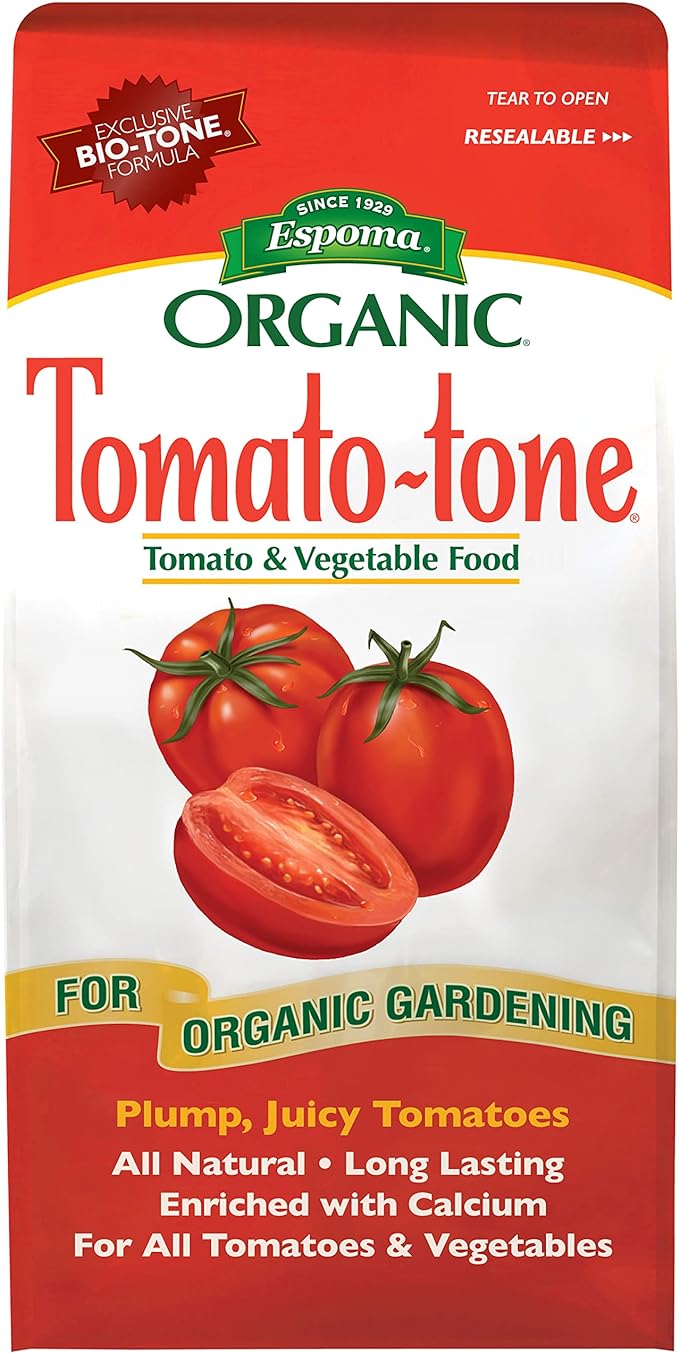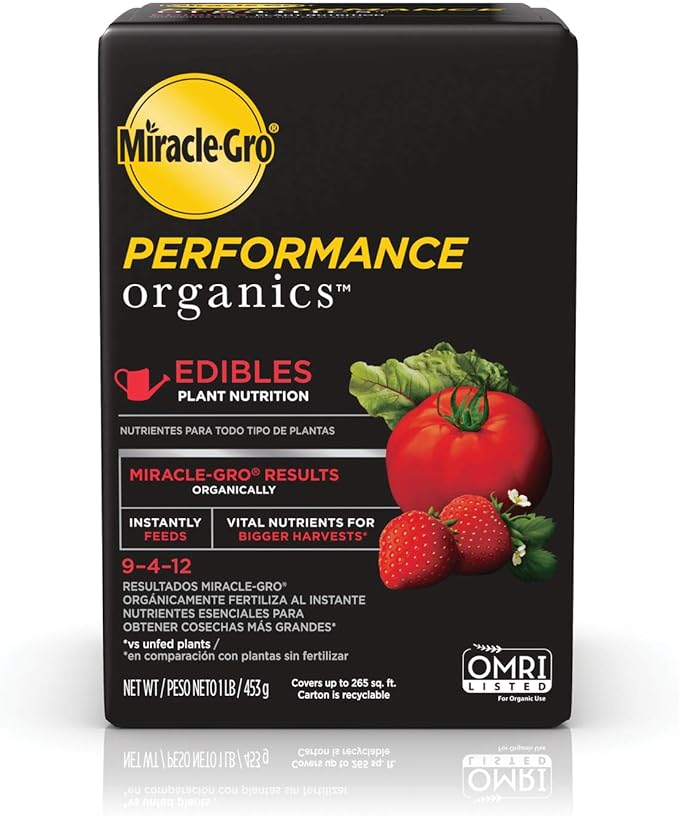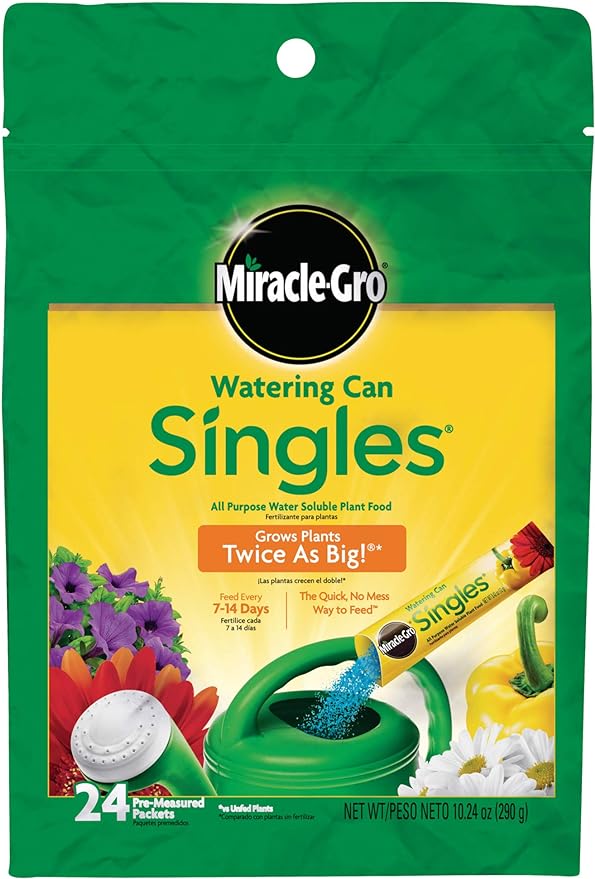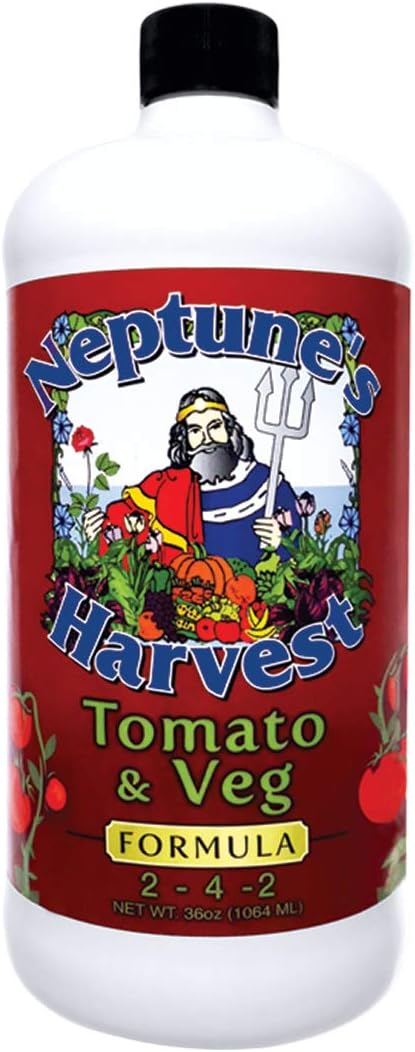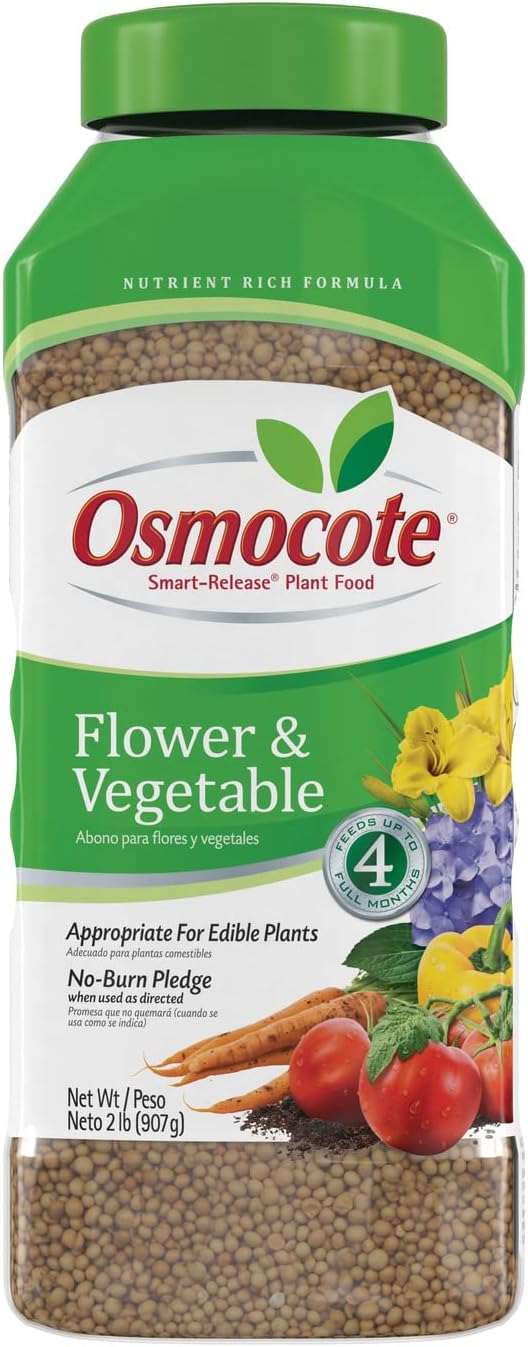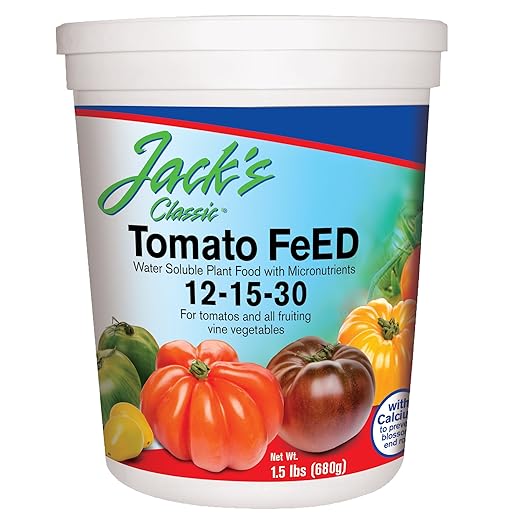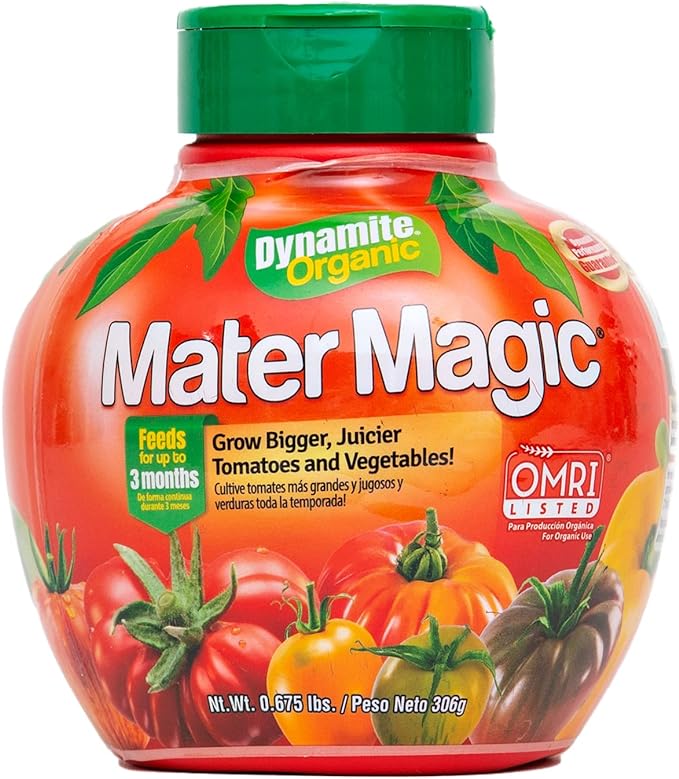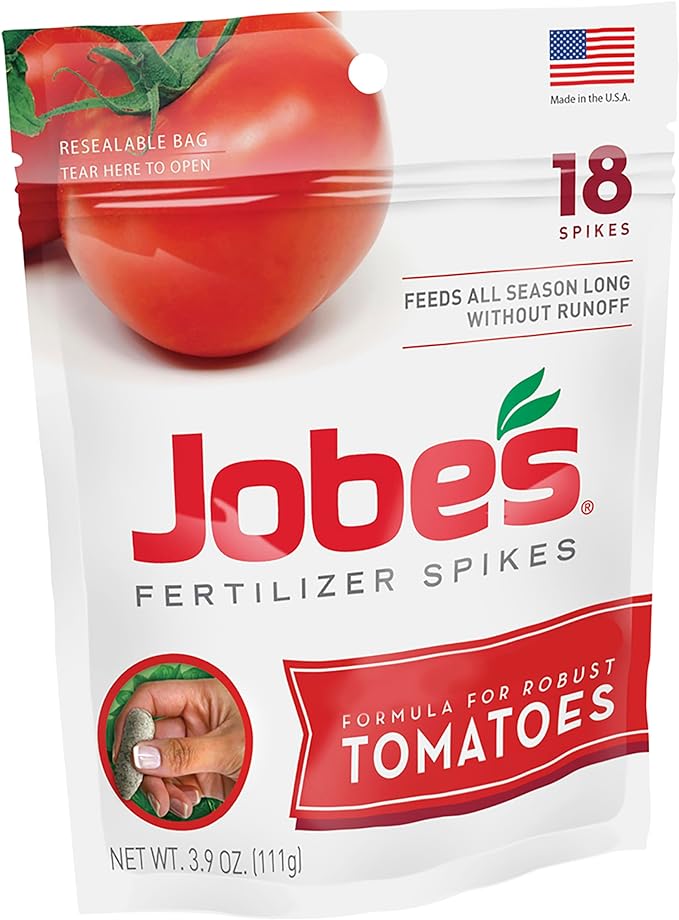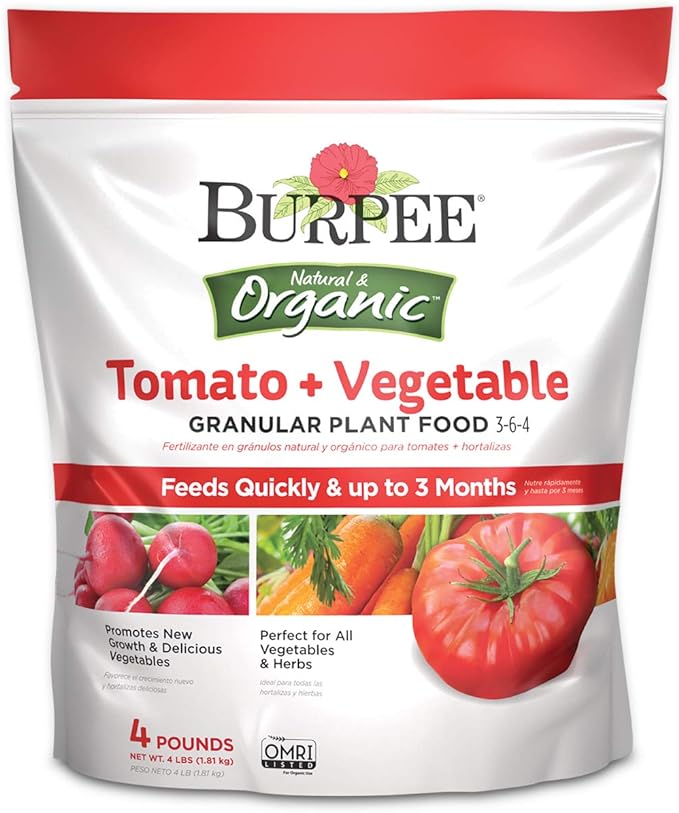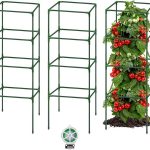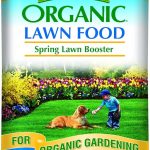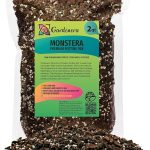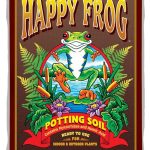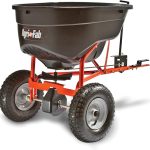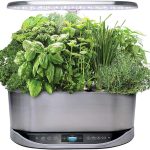As you prepare to nurture your tomato plants, you’re faced with a challenging task: selecting the best fertilizer for a thriving harvest. With numerous options available, you need to weigh your plants’ specific needs. You might be wondering, which fertilizer will provide the perfect balance of nutrients for your tomatoes to flourish? From organic to water-soluble options, the choices seem endless. But, with the right guidance, you can make an informed decision. Let’s explore the top 9 tomato fertilizers that’ll help you achieve a bountiful harvest – but first, what makes a fertilizer truly effective for your tomatoes?
Contents
- Espoma Organic Tomato-Tone Fertilizer
- Miracle-Gro Organic Plant Food for Tomatoes, Vegetables, Herbs and Fruits
- Miracle-Gro Water Soluble Plant Food
- Neptunes Harvest Tomato & Veg Fertilizer 2-4-2, 36 oz
- Osmocote Smart-Release Plant Food Flower & Vegetable, 2 lb.
- Jacks Classic Tomato Feed Fertilizer
- Dynamite Mater Magic Organic Tomato Fertilizer
- Jobe’s Garden Fertilizer Spikes for Tomato Plants
- Burpee Organic Tomato & Vegetable Granular Plant Food, 4 lb
- Factors to Consider When Choosing Tomato Fertilizers
- Frequently Asked Questions
- Conclusion
Espoma Organic Tomato-Tone Fertilizer
If you’re looking for a fertilizer that’s specifically formulated to prevent blossom end rot and promote abundant tomato production, Espoma Organic Tomato-Tone Fertilizer is an excellent choice.
This 4-pound bag of 3-4-6 fertilizer with 8% calcium is designed for use on all types of tomatoes and vegetables.
You can apply it to the soil around the drip line of the plant, watering thoroughly, and repeating every two weeks through the growing season.
By doing so, you’ll promote flower and fruit production, while preventing blossom end rot.
Plus, you can feel good about using an environmentally safe fertilizer that’s free of sludges and toxic ingredients.
Best For: Gardeners who want to promote healthy tomato and vegetable growth while preventing blossom end rot with an environmentally safe fertilizer.
Pros:
- Effective in promoting flower and fruit production and preventing blossom end rot
- Environmentally safe and free of sludges and toxic ingredients
- Easy to use and apply to the soil around the plant
Cons:
- Some customers mentioned a strong fertilizer smell
- No other cons mentioned in the product details or customer reviews
- No other cons mentioned in the product details or customer reviews
Miracle-Gro Organic Plant Food for Tomatoes, Vegetables, Herbs and Fruits
For gardeners seeking an OMRI-listed organic plant food that can be applied every 7 days, Miracle-Gro Organic Plant Food for Tomatoes, Vegetables, Herbs and Fruits is an excellent choice.
This fertilizer is specifically formulated to promote a bountiful harvest of your favorite fruits and veggies.
As you feed your garden plants every 7 days, you’ll start to notice a difference.
With its easy-to-use tablets, you can simply dissolve them in water and apply the solution to your plants.
With over 5,000 ratings and a 4.5-star average, this fertilizer has earned its spot as a best-seller.
Just be aware that some users have reported a strong smell, difficulty dissolving the fertilizer, or residue left behind.
Best For: Gardeners seeking an OMRI-listed organic plant food for their tomatoes, vegetables, herbs, and fruits.
Pros:
- OMRI-listed organic plant food that promotes a bountiful harvest
- Easy to use with tablets that can be dissolved in water
- Can be applied every 7 days for best results
Cons:
- Some customers reported a strong, unpleasant smell
- Some customers reported difficulty with dissolving the fertilizer in water
- Some customers reported issues with the fertilizer not fully dissolving, leaving residue at the bottom of the watering can
Miracle-Gro Water Soluble Plant Food
You’ll get the best results with Miracle-Gro Water Soluble Plant Food, a convenient and easy-to-use fertilizer that provides essential nutrients to promote healthy plant growth, especially for those who want to feed their plants regularly without the hassle of measuring.
This product comes with 24 pre-measured packets, making it easy to use and mess-free. You can feed your plants every 1-2 weeks, and you’ll start to see quick, beautiful results.
With Miracle-Gro Water Soluble Plant Food, your plants will grow twice as big as unfed plants. This fertilizer is perfect for all flowers, vegetables, houseplants, roses, and trees and shrubs.
With an impressive 4.8-star rating from over 13,000 customers, you can trust that this product will deliver.
Best For: Home gardeners who want a convenient and easy-to-use fertilizer for their flowers, vegetables, houseplants, roses, and trees and shrubs.
Pros:
- Convenient and easy to use with pre-measured packets
- Promotes healthy plant growth and yields quick, beautiful results
- Can be used on a variety of plants, including flowers, vegetables, houseplants, roses, and trees and shrubs
Cons:
- No cons mentioned in the product description or customer reviews
- No cons mentioned in the product description or customer reviews
- No cons mentioned in the product description or customer reviews
Neptunes Harvest Tomato & Veg Fertilizer 2-4-2, 36 oz
With its unique 2-4-2 blend of nitrogen, phosphorus, and potassium, Neptunes Harvest Tomato & Veg Fertilizer 2-4-2, 36 oz is the best choice for gardeners seeking maximum growth, strong root development, and abundant fruit production in their tomatoes and vegetables.
You’ll notice a significant increase in vigor and volume of your crops, and it’s not just limited to tomatoes – it’s ideal for vegetables, trees, shrubs, and flowers too.
This fertilizer helps your plants tolerate drought, and its nutrient-rich formula promotes strong root development, abundant blossoms, and increased fruit production.
Many users have seen a huge difference in their plants after using this fertilizer, with some even reporting a miraculous transformation.
Best For: Gardeners seeking maximum growth, strong root development, and abundant fruit production in their tomatoes and vegetables.
Pros:
- Nutrient-rich formula for optimal growth
- Easy application
- Bountiful harvest
Cons:
- Pricey
- Strong, fishy odor
Osmocote Smart-Release Plant Food Flower & Vegetable, 2 lb.
Osmocote Smart-Release Plant Food Flower & Vegetable is an excellent choice if you’re looking for a fertilizer that provides long-lasting nutrients to your tomatoes without the risk of over-fertilization.
With its 14-14-14 NPK formula, it promotes strong roots and vigorous above-ground growth.
This slow-release technology provides nutrients for up to 6 months, and you don’t have to worry about over-fertilizing, as it’s ‘mistake-proof.’
You can apply it to your vegetable garden, mulched areas, or raised beds, covering about 40 square feet.
The included applicator makes it easy to mix into the soil.
With Osmocote, you’re guaranteed to see results, and if you’re not satisfied, you can get a full refund.
Best For: Gardeners who want a long-lasting and mistake-proof fertilizer for their flowers, vegetables, and herbs.
Pros:
- Provides nutrients for up to 6 months with its slow-release technology
- Promotes strong roots and vigorous above-ground growth with its 14-14-14 NPK formula
- Guaranteed performance with a full refund if unsatisfied
Cons:
- No cons mentioned in the product description
- No cons mentioned in the product description
- No cons mentioned in the product description
Jacks Classic Tomato Feed Fertilizer
For gardeners seeking a fertilizer that promotes abundant fruit set and flowering in blooming vegetables, Jacks Classic Tomato Feed Fertilizer is the best choice, offering a 12-15-30 analysis for vigorous plant growth.
You’ll appreciate its water-soluble powder formula, which makes multiple gallons of liquid fertilizer, and the included measuring spoon for convenient use.
This fertilizer also provides micronutrients for healthy growth and robust health.
With Jacks Classic, you can expect to see significant and noticeable growth within just two days of application.
It’s effective for tomatoes, peppers, cucumbers, squash, and other blooming vegetables, and works well for indoor gardening and houseplants.
Best For: Gardeners seeking a fertilizer that promotes abundant fruit set and flowering in blooming vegetables, particularly those growing tomatoes, peppers, cucumbers, squash, and other blooming vegetables.
Pros:
- Promotes vigorous plant growth, abundant flowering, and fruit set with its 12-15-30 analysis
- Cost-effective compared to liquid fertilizers, with a 1.5lbs container lasting for 1 month
- Works well for indoor gardening and houseplants, with users reporting significant and noticeable growth within just two days of application
Cons:
- Requires reapplication if magnesium or calcium deficiencies are noticed later in the season
- Needs to be switched to all-purpose or bloom booster after the first two fertilizer applications
- No additional benefits or features beyond its fertilizer properties
Dynamite Mater Magic Organic Tomato Fertilizer
Opting for Dynamite Mater Magic Organic Tomato Fertilizer guarantees you’ll be feeding your tomatoes a nitrogen and calcium-rich plant food that promotes bigger, juicier yields for up to three months.
This natural and organic fertilizer is OMRI listed, ensuring it’s safe for your plants and the environment.
You’ll appreciate the convenience of the 0.675-pound container with a shaker lid, making it easy to apply the granules to your tomato plants.
With Dynamite Mater Magic, you can expect to see an increase in tomato yields and healthier plant growth. Plus, it prevents end rot, ensuring you get the most out of your harvest.
With an impressive 4.5-star rating and over 662 customer reviews, you can trust that this fertilizer will deliver the results you’re looking for.
Best For: Gardeners and tomato growers looking for a natural and organic fertilizer that promotes healthy plant growth and increases tomato yields.
Pros:
- Natural and organic fertilizer that is OMRI listed, ensuring it’s safe for plants and the environment
- Convenient shaker lid makes it easy to apply the granules to tomato plants
- Feeds continuously for up to 3 months, promoting bigger, juicier tomatoes with higher yields
Cons:
- No negative reviews or drawbacks mentioned
- No negative reviews or drawbacks mentioned
- No negative reviews or drawbacks mentioned
Jobe’s Garden Fertilizer Spikes for Tomato Plants
Tomato enthusiasts looking for a hassle-free, mess-free fertilizer solution will find Jobe’s Garden Fertilizer Spikes for Tomato Plants to be the best choice, providing a continuous supply of nutrients for up to 8 weeks.
You’ll appreciate the pre-measured spikes that eliminate the risk of over-fertilizing, ensuring your plants receive the right amount of nutrients.
The slow-release formula is formulated with a 6-18-6 NPK ratio, promoting healthy plant growth and development.
With Jobe’s, you can say goodbye to mess, hazards, and smells, and hello to beautiful, thriving tomato plants.
Plus, the product is available in a convenient, resealable pouch or cardboard blister card pack, making it easy to store and use.
Best For: Tomato enthusiasts and gardeners who want a hassle-free, mess-free fertilizer solution that provides a continuous supply of nutrients for their tomato plants.
Pros:
- Provides a continuous supply of nutrients for up to 8 weeks
- Pre-measured spikes eliminate the risk of over-fertilizing
- Slow-release formula promotes healthy plant growth and development
Cons:
- No notable cons mentioned in the product description or customer reviews
- No notable cons mentioned in the product description or customer reviews
- No notable cons mentioned in the product description or customer reviews
Burpee Organic Tomato & Vegetable Granular Plant Food, 4 lb
If you’re looking for a fertilizer that provides long-lasting results, Burpee Organic Tomato & Vegetable Granular Plant Food is the best choice, as its easy-to-apply granules release essential nutrients immediately and continue to provide a continuous stream of plant food for up to 3 months.
This OMRI-listed organic fertilizer is perfect for young bedding plants, established vegetable gardens, and patio container plants.
With its natural composition, free from synthetic chemicals and harmful additives, you can trust it to promote healthy soil and robust plant growth.
As a versatile fertilizer, it’s suitable for a variety of plants, including tomatoes, strawberries, blueberries, and many more.
With over 16,800 ratings and a 4.6-star rating, you can rely on its effectiveness and ease of use.
Best For: Gardeners who want a natural, long-lasting fertilizer for their vegetable and flower gardens, including young bedding plants, established gardens, and patio container plants.
Pros:
- Provides long-lasting results for up to 3 months with its easy-to-apply granules
- OMRI-listed organic fertilizer that promotes healthy soil and robust plant growth without synthetic chemicals and harmful additives
- Versatile and suitable for a variety of plants, including tomatoes, strawberries, blueberries, and many more
Cons:
- No notable cons mentioned in the product description or customer reviews
- No information available on the product’s potential drawbacks or limitations
- No customer reviews mentioning any negative experiences or issues with the product
Factors to Consider When Choosing Tomato Fertilizers
When selecting a tomato fertilizer, you’ll want to weigh several key factors that impact your plants’ growth and health.
You’ll need to think about the type of soil you’re working with, the balance of nutrients your tomatoes need, and whether you prefer organic or synthetic fertilizers.
Soil Type Matters
As you prepare to fertilize your tomato plants, keep in consideration that the specific needs of your soil type play a significant role in determining the effectiveness of your fertilizer.
The pH level of your soil, for instance, affects the availability of nutrients for your tomato plants. Ideally, you want your soil pH to fall between 6.0 and 6.8 for peak growth.
The texture of your soil also matters. If you have sandy soil, you may need to fertilize more frequently due to its low water-holding capacity and rapid nutrient leaching.
On the other hand, clay soils may require less frequent fertilization thanks to their high water-holding capacity and slower nutrient release.
Additionally, the organic matter content in your soil, such as compost or humus, can impact fertilizer efficiency by influencing nutrient availability and microbial activity.
Nutrient Balance Counts
You’ll want to make certain your tomato fertilizer has a balanced mix of essential nutrients, as an imbalance can lead to deficiencies and negatively impact your plant’s health and productivity.
A balanced fertilizer should contain a mix of nitrogen (N), phosphorus (P), and potassium (K), with a general ratio of 10-10-10 or 20-20-20 for ideal growth and fruit production.
Nitrogen promotes leaf growth and green color, phosphorus supports root development and flower and fruit formation, and potassium helps with overall plant health and resistance to disease.
If the fertilizer is too heavy on nitrogen, you might see weak stem growth, while too little phosphorus can lead to poor fruit set.
Don’t forget about calcium, which prevents blossom-end rot and promotes healthy cell wall development.
Additionally, micronutrients like magnesium, sulfur, and boron are essential for photosynthesis, root growth, and fruit quality.
Organic Vs Synthetic
With your tomato plants’ nutrient balance in check, it’s time to weigh the pros and cons of organic versus synthetic fertilizers to make an informed decision about which type to use.
When evaluating organic fertilizers, you’ll notice they release nutrients slowly, promoting soil health and biodiversity. While they’ve a lower nutrient analysis, requiring more volume, their natural components and long-term benefits make them a sustainable choice.
On the other hand, synthetic fertilizers provide rapid nutrient delivery but can harm soil microorganisms and contaminate groundwater. They often contain fillers and inert ingredients, making them a less desirable option for environmentally conscious gardeners.
While organic fertilizers tend to be more expensive, their benefits outweigh the cost. You’ll need to deliberate your priorities: rapid growth or long-term soil health. If you’re willing to invest in your soil’s future, organic fertilizers might be the better choice.
However, if you’re looking for a quick fix, synthetic fertilizers might seem appealing. Ultimately, carefully weighing the pros and cons is crucial to make an informed decision that aligns with your gardening goals and values.
Plant Growth Stage
Different tomato fertilizer formulations are suited to specific plant growth stages, and choosing the right one depends on whether your plants are seedlings, producing flowers and fruits, or nearing harvest time.
As you nurture your tomatoes, you’ll need to adjust your fertilizer strategy to match their development.
When your tomatoes are seedlings, they need a balanced fertilizer with equal nitrogen, phosphorus, and potassium (NPK) ratios. This promotes healthy root development and leaf growth.
As they mature and start producing flowers and fruits, you’ll want to shift to a fertilizer with a higher phosphorus content to support fruiting and flowering. This is usually around the time they’re about 12-18 inches tall and showing signs of flowering.
When your tomatoes are nearing harvest time, you can switch to a fertilizer with a higher potassium content to help ripen the fruits and enhance their flavor.
Climate and Weather
When choosing the best tomato fertilizers for your garden, you should consider two key climate and weather factors: temperature and moisture levels, as they profoundly impact nutrient absorption and plant growth.
Extreme temperatures, drought, or excessive rainfall can affect how well your tomato plants absorb nutrients, making it essential to adjust your fertilizer strategy accordingly.
In areas with high temperatures and low humidity, you may need to fertilize more frequently to compensate for nutrient loss due to soil evaporation.
On the other hand, water-soluble fertilizers might be a better choice in regions with heavy rainfall, as they can be easily absorbed by the plants.
If you’re gardening in a dry climate, granular fertilizers might be more suitable.
Soil temperature also plays a pivotal role, with peak nutrient uptake occurring between 60°F to 80°F (15°C to 27°C).
Make sure to apply fertilizers during this temperature range for maximum effectiveness.
Tomato Variety Needs
As you tailor your fertilizer strategy to your climate and weather conditions, you’ll also need to take into account the specific needs of your tomato variety, since some require more nutrients than others.
For instance, cherry tomatoes and patio tomatoes need less fertilizer than larger varieties, which require more nutrients to support their growth.
If you’re growing heirloom tomatoes, be aware that they’re more sensitive to soil conditions and may require more calcium and magnesium to prevent blossom-end rot.
The type of tomato you’re growing also affects its fertilizer needs.
Indeterminate tomatoes, which continue to grow and produce fruit throughout the season, may require more frequent fertilization than determinate varieties, which stop growing after reaching a certain height.
Additionally, some tomato varieties, such as Roma or Plum tomatoes, are bred for their high acid content and may require more potassium to support fruit development.
Budget and Value
You’ll want to weigh the cost of tomato fertilizers against their benefits, considering the price per pound or ounce, as well as the number of plants they can support, to guarantee you’re getting the best value for your budget.
When choosing a fertilizer, consider the cost per unit of fertilizer and the coverage area or number of plants it can support. This will help you determine the best value for your budget.
Keep in mind that fertilizers with higher nutrient concentrations might be pricier upfront, but they can provide longer-lasting results and better value in the long run.
If you opt for organic or natural fertilizers, be prepared for a higher upfront cost. However, these options often provide additional benefits like improved soil health and eco-friendly production methods.
When calculating the overall cost and value, don’t forget to factor in the frequency of application and the duration of the fertilizer’s effects.
Frequently Asked Questions
Can I Use Tomato Fertilizer on Other Types of Plants?
You’re wondering if you can use tomato fertilizer on other plants. Generally, you can, but it depends on the type of fertilizer and the specific needs of the other plants, so you’ll want to check the label and your plants’ requirements.
How Often Should I Fertilize My Tomato Plants?
“You’re probably thinking, ‘Fertilize my tomatoes daily, and I’ll be swimming in juicy fruits!’ Not exactly. In reality, you should fertilize your tomato plants when they’re about 6-8 inches tall, and then every 1-2 weeks during fruiting.”
Is It Safe to Over-Fertilize My Tomato Plants?
You’re wondering if it’s safe to over-fertilize your tomato plants? Honestly, it’s not; excessive nutrients can damage your plants, causing weak growth, yellowing leaves, and even plant death, so you must carefully follow the fertilizer instructions.
Can I Make My Own Organic Tomato Fertilizer at Home?
Imagine your grandma’s thriving tomato garden, thanks to her secret homemade fertilizer recipe. You can create your own organic tomato fertilizer at home by mixing 2 parts “eggshell tea” with 1 part compost, and 1 part coffee grounds – it’s easy and eco-friendly!
Do I Need to Fertilize Seedlings Differently Than Mature Plants?
When nurturing tomatoes, you’ll need to adjust fertilization strategies as they grow. Seedlings require gentle, balanced fertilizers, while mature plants benefit from more nitrogen-rich formulas to promote fruiting and flowering.
Conclusion
You’ve made it to the end of your tomato fertilizer journey!
With these top 9 picks, you’re now equipped to give your plants the nutrients they need to thrive.
Did you know that using the right fertilizer can increase your tomato yield by up to 20%?
Imagine the look on your friends’ faces when you show up to the summer potluck with a basket full of juicy, ripe tomatoes.
Get ready to reap the rewards of your hard work and enjoy the fruits of your labor!
